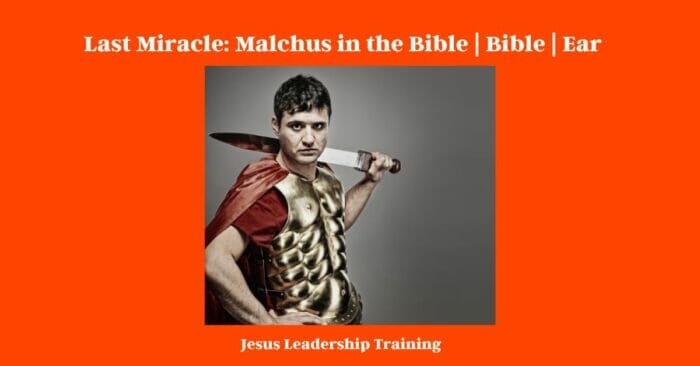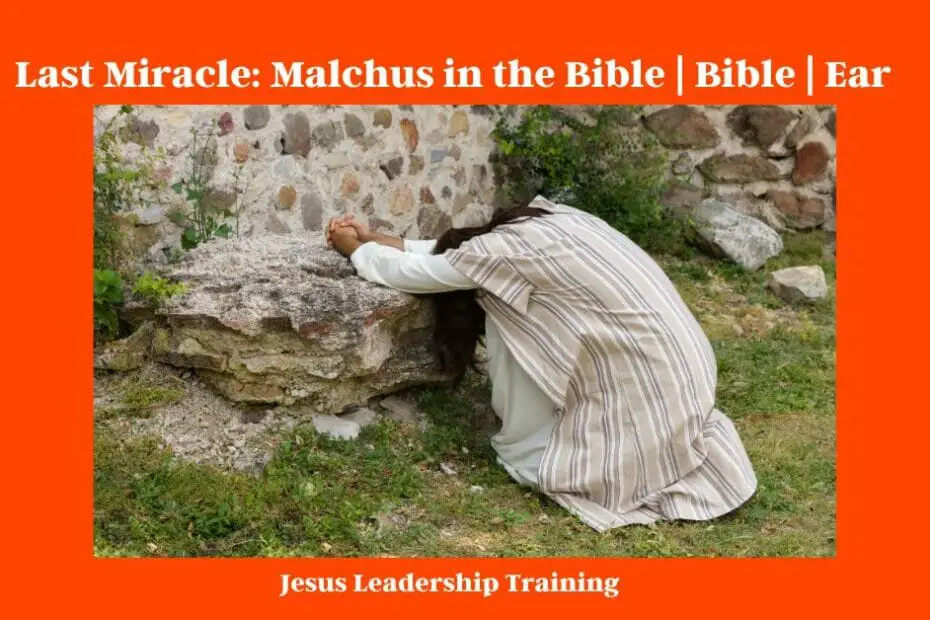So, the title could look like: “Malchus in the Bible 📖✂
Who was Malchus in the bible? This is a question that many people ask. Malchus was a servant of the high priest’s servant, who was attacked by Peter during the arrest of Jesus.. This event is recorded in the gospel of John. Malchus in the bible was not a major character, but his story is an interesting one. In this blog post, we will take a closer look at Malchus’ role in the Bible and what his story teaches us about God’s love and forgiveness.
Table of Contents
Who Was Malchus in the Bible?
Malchus is best known as the man whose ear was cut off by Peter during Jesus’ arrest in the Garden of Gethsemane. As one of the high priest’s servants, he was part of the group that came to arrest Jesus. During the struggle, Peter drew his sword and cut off Malchus’ ear. Jesus then healed Malchus’ ear.
What Happened to Malchus After Jesus Healed His Ear
the story of Malchus is quite compelling. He was the servant of the high priest whose ear was cut off by Peter during Jesus’s arrest but was miraculously healed by Jesus. Let’s look at what different sources say about what happened to Malchus after this life-altering event.
| Source | Information | Details and Interpretation |
|---|---|---|
| Bible | Gospel Accounts | The Bible does not provide further details about what happened to Malchus after his ear was healed. The last mention of him is in the Gospels where the healing takes place (John 18:10; Luke 22:50-51; Matthew 26:51; Mark 14:47). |
| Traditions | Church History and Tradition | Church traditions are mostly silent about Malchus’ life post-healing. There’s no widely accepted tradition concerning what happened to him afterward. Some traditions suggest he might have become a Christian, but this is speculative. |
| Apocryphal Texts | Non-Canonical Writings | Some apocryphal texts and legends suggest Malchus became a follower of Jesus after the incident, but these are not considered authoritative or reliable. |
| Theological Interpretations | Various Theological Opinions | Theologians often use the story of Malchus to discuss the theme of divine mercy and Jesus’ intention to heal even those who were part of the process leading to His crucifixion. However, these interpretations do not provide historical details about Malchus’ later life. |
| Art and Literature | Depictions in Art and Literature | Malchus occasionally appears in Christian art, usually in scenes depicting the arrest of Jesus. These artistic depictions focus on the moment of the healing but do not offer insights into his life afterward. |
| History | Historical Records | There are no known historical records that provide additional information about what happened to Malchus after his encounter with Jesus. |
Important Note: The absence of detailed information about Malchus after his healing is notable, but it also reflects the focus of the Gospel writers, which was to tell the story of Jesus. The incident involving Malchus serves to highlight Jesus’ compassion and power, even in the face of betrayal and imminent arrest.
While we may not know what happened to Malchus, the story of his healing serves as a powerful testament to Jesus’ mercy and the transformative power of divine touch. It leaves us to ponder what impact such a miraculous event might have had on his life.

Beyond this brief episode, we know very little about Malchus. He is not mentioned by name in any other part of the Bible. However, his story provides a powerful lesson about the power of forgiveness. In the midst of great conflict and betrayal, Jesus was still able to offer compassion and healing. As we follow Christ, we too are called to extend forgiveness, even to those who have wronged us.
Malchus was a personal servant and shows the action of his disciple, at jesus’ arrest Recorded by Gospel writers during the time of the savior.. Then Simon Peter, in the Gospel of Luke, gives mention of Malchus where the apostle Peter, cut off Malchus’s Ear and the healing of Malchus. The Son of God could of used legions of angels to protect the son of man. Peter assaults Malchus’ life ending up swinging and cutting off the servant’s ear.
The Malchus Name of the Servant of the High Priest Meaning?
Malchus (servant’s name) was the slave of the high priest named Caiaphas, (chief priests). He is most well-known for being the man whose ear was cut off by Simon Peter during Jesus’ arrest in the Garden of Gethsemane. The name Malchus is Greek and means “king” or “ ruler.” It is also possible that his name was actually Marcus, which was a common Roman name.
The Bible does not give us any other information about Malchus other than his connection to Caiaphas and his role in Jesus’ arrest. We can only speculate about his character and motives. Did he believe in Jesus? Did he enjoy carrying out the orders of the high priest? Was he simply following orders when he helped to arrest Jesus? We may never know the answers to these questions, but Malchus will forever be remembered as a key figure in the events leading up to Jesus’ crucifixion.
What was the relationship Between Jesus and Malchus (slave of the High Priest Caiaphas)
The book of John records an interesting event that took place in the Garden of Gethsemane. Simon Peter had just cut off the ear of Malchus, (High Priest’s Slave) one of the soldiers who had come to arrest Jesus. Jesus then healed Malchus’ ear (John 18:10). From this incident, we learn that even though Jesus was about to be betrayed and arrested, He still cared for those who were harming Him.
In addition, this act of healing shows us that Jesus is merciful and forgiving, even to His enemies. We also see that Jesus is willing to work through His followers to accomplish His purposes. In this case, He used Peter’s impulsive act of violence to perform a miracle of healing. As we read the story of Jesus’ arrest, we see that He is willing to reach out to even the most unlikely people.
Even in the midst of His own suffering, Jesus was concerned for the well-being of others. This incident reminds us that we should follow His example by showing mercy and compassion, even to those who may seem like our enemies.
Why was Jesus in The Garden of Gethsemane when he encountered Malchus?
There are a few different theories as to why Jesus was in the Garden of Gethsemane when he was arrested. One possibility is that Jesus was trying to avoid being arrested in the city, where there would have been more of a crowd and more chaos. Another possibility is that Jesus went to the garden specifically to pray.
The garden was a popular place for prayer, and it is possible that Jesus went there to clear his head and spend some time alone with God before his arrest. It is also worth noting that the Garden of Gethsemane was near the Mount of Olives, which was a significant place for Jews both spiritually and physically.

The Mount of Olives was where many of the prophets had preached, and it was also where the Messiah was believed to come from. As such, it is possible that Jesus went to the garden in order to be closer to God and to prepare himself spiritually for what was about to happen. Whatever the reason, it is clear that Jesus had a purpose in going to the Garden of Gethsemane, and that purpose ultimately led him to encounter Malchus.
What do you think was the Effect on Malchus when Jesus Healed him?
Malchus was the man whose ear was cut off by Simon Peter when the temple guards came to arrest Jesus in the Garden of Gethsemane. We don’t know anything else about him, but we can imagine what might have been going through his mind when Jesus healed his ear.
First of all, he would have been surprised. He was probably expecting to be arrested and perhaps even killed, so the last thing he would have expected was for Jesus to heal his wound. But Jesus did heal him, and we can only imagine the look of disbelief on Malchus’ face.
Secondly, he would have been thankful. Simon Peter had just attacked him, and yet Jesus still showed mercy and compassion by healing his ear. This must have been a powerful demonstration of love, and it would have left a lasting impression on Malchus.
Finally, he would have been confused. He would have seen and heard things that night that he didn’t understand. What exactly was this man who could calm a storm with a word and heal a wound with a touch? Malchus would have had many questions, but unfortunately, we don’t know what became of him so we’ll never know the answers.
What was the effect of Jesus of Nazareth Healing Malchus, Jesus’ attacker?
The account of Jesus healing Malchus, the man who came to arrest Jesus, is found in all four gospels. This implies that it was an important event with far-reaching implications. By offering forgiveness and healing to His attacker, Jesus was demonstrating His love for all people, even those who sought to do Him harm.
This act also showed that He is the Prince of Peace. He could have easily retaliated against His attacker, but instead, He chose to extend grace. In doing so, He set an example for us to follow. When we are faced with violence or hatred, we can choose to respond with love and forgiveness. In doing so, we can help to bring about healing and reconciliation in our world.

What feelings do you think Peter was feeling when he Cut Off Malchus Ear?
In the Book of Luke, we are told the story of how Peter Cut Off Malchus Ear. While this may seem like a violent act, it is important to understand the context in which it occurred. Jesus had just been arrested, and Peter was trying to prevent his disciples from being captured as well. In the heat of the moment, he lashed out at the man who was trying to take Jesus away and ended up severing his ear.
It is likely that Peter was feeling a mix of fear, anger, and desperation at this time. He may have also felt guilty after realizing what he had done. However, Jesus quickly healed Malchus and used the incident as an opportunity to teach his disciples about turning the other cheek. In the end, Peter’s actions were not motivated by hate or violence, but by a deep desire to protect his friend and teacher.
What is Jesus showing us when we are wrongfully attacked?
When we are wrongfully attacked, it can be tempting to retaliate. However, Jesus shows us a different way. In the book of Matthew, Jesus tells his disciples to love their enemies and pray for those who persecute them. This doesn’t mean that we allow ourselves to be mistreated. But it does mean that we refuse to stoop to their level and instead extend grace and compassion. By responding in this way, we demonstrate the power of love and forgiveness. We also model Christ’s character and remind others that there is hope for change, no matter how difficult the situation may seem. Ultimately, when we are wrongfully attacked, Jesus shows us that love is always the more powerful force.
List of other Times Jesus shared Forgiveness when Justice would have Pointed Different Direction
When we think about justice, what often comes to mind is a punishment that is deserved. But Jesus challenges us to consider a different kind of justice—a justice that brings healing and restoration. In the Bible, we see numerous examples of Jesus forgiving when justice would dictate a different outcome.
One such example is found in John 8:1-11, when Jesus is presented with a woman caught in the act of adultery. The religious leaders bring her to him, hoping he will condemn her to death according to the Law of Moses. But instead, Jesus says to them, “Let any one of you who is without sin be the first to throw a stone at her.” One by one, they all drop their stones and walk away. Then Jesus says to the woman, “Neither do I condemn you…go now and leave your life of sin.”
Another example is found in Luke 23:34 when Jesus is on the cross being crucified. As he hangs there in agony, he prays for those who are responsible for his pain and suffering, saying, “Father, forgive them; for they know not what they do.”
In both of these examples, we see Jesus extend forgiveness rather than condemnation—even when justice would have dictated a different outcome. He sets aside what is fair and just according to worldly standards, and instead offers mercy and grace. May we follow his example and do likewise.
Final Thought – Malchus in the Bible
In conclusion, the story of Malchus in the Bible is a powerful reminder of the importance of love and forgiveness. No matter how difficult the situation may be, Jesus shows us that love is always more powerful than hate. When we are wrongfully attacked, we can choose to respond with grace and compassion. By doing so, we model Christ’s character and extend hope to those who may feel hopeless. Let us follow Jesus’ example and extend forgiveness, even when justice would dictate a different outcome.
This was the last miracle of bodily cure, the smiting of Malchus at Jesus’ arrest. Jesus account Miraculous account of the healing of the wound/
God Bless Greg




